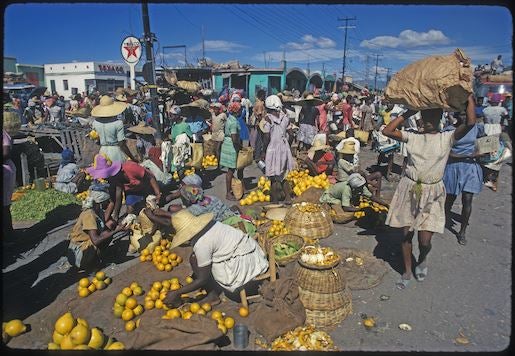By: France Francois
When most people hear the term “market” they picture an orderly scene with vendors perched at their stalls, selling goods to potential clients casually strolling by. The colorful scene at Marché de Poteau (Poteau Market) outside of Gonaïves in central Haiti immediately challenged that notion for the participants of the Fourth Annual Involuntary Resettlement Workshop jointly put on by the IDB and the World Bank.
Participants found vendors expertly weaving in and out of traffic hawking everything from pigs to produce precariously balanced on heads or hips, as brightly colored Haitian Tap-Taps (mini-buses) zoomed by.
Suddenly, the exercise of considering the impact that widening the road and potentially moving the market would have on traffic and the lives of merchants- and to think about how we could alleviate any possible negative impacts- seemed a lot more challenging than it had originally sounded in the conference room!
Involuntary resettlement—moving a population as the result of an external cause such as a natural disaster, famine, or a development project—is acutely relevant in the post-quake context as the IDB and the Haitian government focus on priority sectors such as private sector development, energy, and transport to continue to create jobs and improve the quality of life for Haitians.
From 2009- 2013 alone, the IDB resettled approximately 33,791 persons in the LAC region, according to the 2012 IDB Sustainability Report.
The fourth annual workshop was a unique opportunity for The IDB and World Bank to collaborate on a training workshop for resettlement in Haiti. Additionally, it was the first time workshop participants, who included resettlement practitioners in the Haitian government and international non-governmental organizations, left the conference room for practical application trainings through field visit exercises.
We explored future project sites, interviewed the potential affected communities, and saw directly how applying the resettlement policies would affect the lives of the people in the area.
In this case, traffic outside of the market was often slowed due to merchants dodging cars to sell goods and cattle alongside the road. Participants discovered that many of the vendors have different incentives for selling within the traditional market vs. along the side of the road such as the type of goods being sold or the availability of funds to rent space indoors. Because of those incentives, moving the market would not necessarily motivate the merchants to leave their positions alongside the road to help alleviate traffic congestion.
Additionally, participants in the workshop learned that the IDB and World Bank policies on involuntary resettlement are quite similar, with both focused on maintaining and improving the lives of resettled people, beyond mitigation to maximizing benefits.
To accomplish that, we consult early and at regular intervals with the affected communities to ensure they can maintain their livelihood, and social cohesion is preserved in resettled communities. As a group, we walked through the market, surveying the offerings and meeting the people who shop and work there to consider their needs and inputs.
Already, discussions have begun to establish a “community of practice” to provide resettlement practitioners with a standing network that meets regularly and to create a curriculum for an extended resettlement training in Haiti.
At the end of the workshop it was clear to participants that the shortest road through the market is not necessarily a straight one.



Leave a Reply